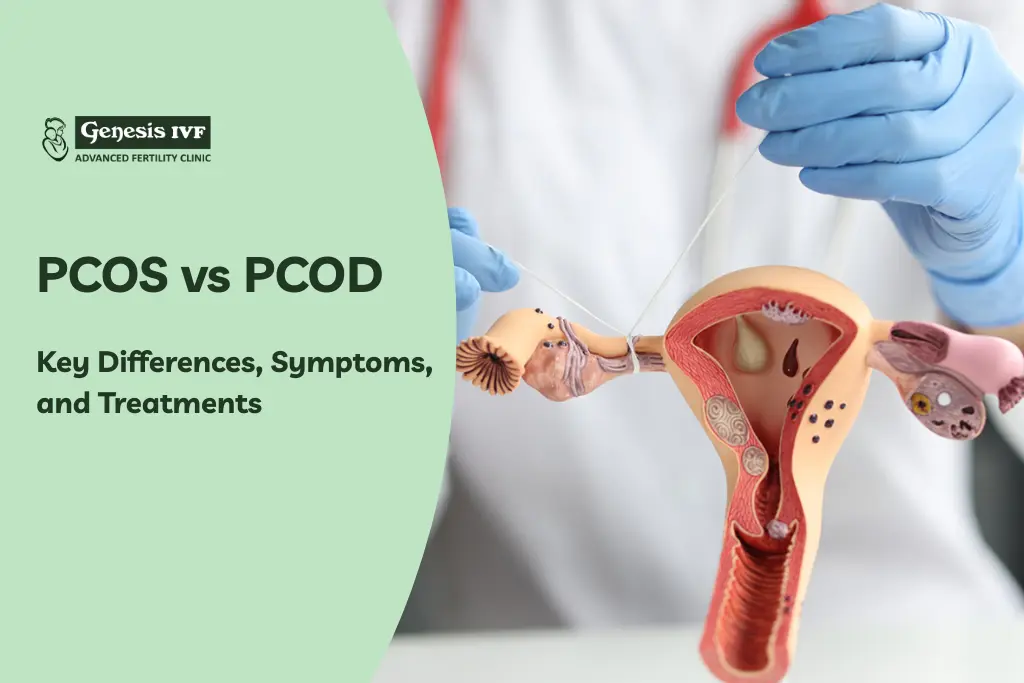Polycystic Ovary Syndrome (PCOS) and Polycystic Ovary Disease (PCOD) are two commonly discussed hormonal disorders affecting women, especially during their reproductive years. Despite sounding similar, they are distinct conditions with differences in causes, symptoms, and treatments. Understanding PCOS vs PCOD is crucial for women who want to maintain reproductive health and manage related complications effectively. Fertility clinics like Genesis IVF often guide women in diagnosing and managing these conditions to ensure better hormonal balance and fertility outcomes.
Struggling with irregular periods, unexplained weight gain, or difficulty conceiving? It could be more than just lifestyle, understanding the difference between PCOS and PCOD might hold the key.
Understanding PCOS and PCOD
The first step in addressing reproductive health issues is knowing the terminology. PCOD full form is Polycystic Ovary Disease, while PCOS stands for Polycystic Ovary Syndrome. Both conditions affect the ovaries but in different ways.
- PCOD is a condition in which the ovaries release immature or partially mature eggs, leading to multiple cysts in the ovaries. This affects hormone balance and can lead to irregular menstrual cycles.
- PCOS, on the other hand, is a more complex endocrine disorder. It not only affects the ovaries but also impacts hormone levels across the body, potentially causing metabolic issues, insulin resistance, and long-term health risks like diabetes and heart disease.
The difference between PCOS and PCOD lies in severity and impact. PCOD is usually milder and primarily affects the ovaries, while PCOS is systemic, requiring ongoing medical management to prevent complications.
Symptoms of PCOS and PCOD
Understanding PCOS symptoms and treatment is essential for early diagnosis. Similarly, recognizing symptoms helps in seeking timely medical intervention.
Common symptoms of PCOD include:
- Irregular periods or missed cycles
- Abdominal weight gain
- Acne and oily skin
- Hair thinning or hair loss
- Fatigue
Symptoms of PCOS problem in females are often more severe and widespread. Some problems overlap with PCOD, but PCOS may also include:
- Excessive facial or body hair (hirsutism)
- Severe acne
- Difficulty conceiving (infertility)
- Insulin resistance and weight gain
- Mood swings and anxiety
The overlap in symptoms sometimes leads to confusion, which is why consulting a specialist at a fertility clinic is recommended. Doctors can perform ultrasound scans, hormone tests, and blood tests to determine the precise condition.
Key Differences Between PCOS and PCOD
The PCOS and PCOD difference can be explained without a table. PCOD is mainly a condition of ovarian dysfunction, where cysts develop due to irregular or immature egg release. Women with PCOD often experience mild menstrual irregularities and can conceive naturally with lifestyle adjustments or minimal treatment.
In contrast, PCOS is a hormonal syndrome affecting multiple systems. Women with PCOS may experience severe menstrual irregularities, difficulty conceiving, insulin resistance, and excessive androgen-related symptoms like facial hair growth. While PCOD can often be managed with lifestyle changes and mild medication, PCOS usually requires a combination of medical therapy, lifestyle modifications, and sometimes fertility treatments like IVF. The difference between PCOS and PCOD is important because misdiagnosis can delay proper treatment and worsen long-term health risks.
Causes and Risk Factors
What is PCOD problem in females? It generally arises from ovarian dysfunction, genetic predisposition, and hormonal imbalances. Factors such as stress, obesity, and irregular lifestyle habits can trigger or worsen PCOD.
PCOS, being a syndrome, has multifactorial causes including insulin resistance, excess androgen production, and inflammation. Women with a family history of diabetes or PCOS are more susceptible.
Treatment Options for PCOS and PCOD
Early diagnosis significantly improves outcomes. PCOS symptoms and treatment focus on managing hormone levels, restoring menstrual regularity, and improving fertility. Common treatments include:
- Lifestyle modifications: Healthy diet, regular exercise, and weight management
- Medication: Oral contraceptives to regulate periods, anti-androgen drugs to reduce hair growth, and metformin for insulin resistance
- Fertility treatments: In severe cases, ovulation-inducing drugs or assisted reproductive technologies like IVF treatment may be recommended
For PCOD, treatment often emphasizes lifestyle changes and diet adjustments to improve ovarian function. Doctors may prescribe medication to stimulate ovulation or control hormonal imbalances.
When to Consult a Fertility Clinic
Recognizing symptoms early is critical. Women experiencing irregular periods, unexplained weight gain, acne, or fertility issues should consult a Fertility Clinic in Chennai like Genesis IVF. These clinics provide comprehensive evaluations, including hormonal profiling, ultrasound scans, and personalized treatment plans. Understanding PCOS and PCOD difference ensures that women receive appropriate care rather than generic treatment.
Conclusion
Though PCOS vs PCOD may seem confusing due to similar names and overlapping symptoms, their causes, severity, and treatment strategies differ significantly. Awareness of pcod pcos symptoms and treatment, and early consultation with a specialist can prevent long-term complications and improve fertility outcomes. With proper guidance from expert clinics like Genesis IVF, women can effectively manage these conditions and maintain reproductive health.




